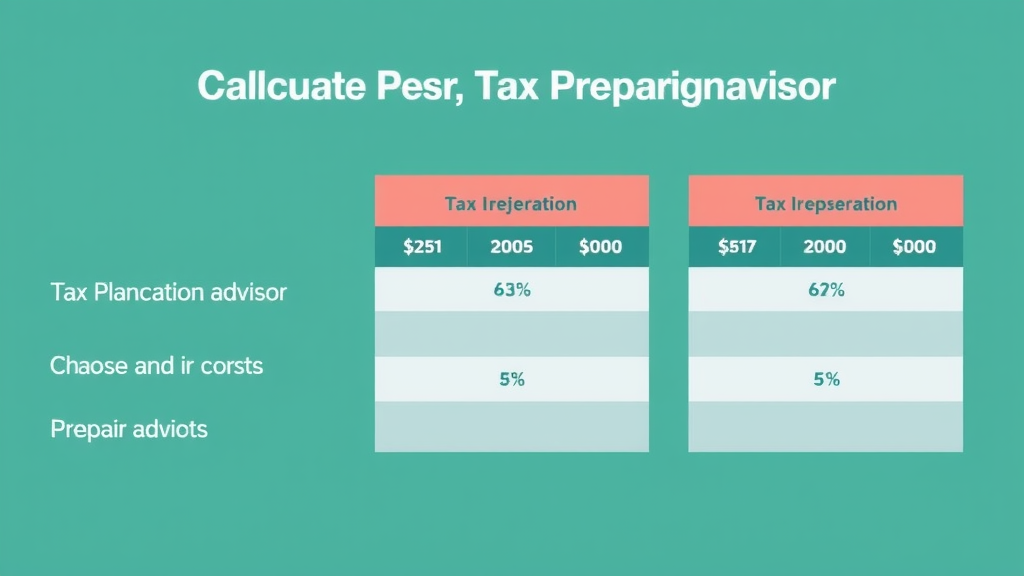Did you know that nearly 20% of taxpayers overpay on their tax return each year due to a lack of proper tax planning ? That’s right— the IRS reports that millions lose out simply by not working with a tax planning advisor . If you’re aiming to keep more of your hard-earned money, minimize your tax burden, and future-proof your financial life, learning from a qualified advisor isn’t just smart; it’s essential.
- Discover how a tax planning advisor can help maximize your tax efficiency, minimize your liabilities, and align your financial plan with your long-term goals.

Why a Tax Planning Advisor Can Be the Key to Your Financial Success
Every financial decision—big or small—comes with tax implications. The difference between a hastily prepared tax return and one informed by a specialist can mean thousands in savings or losses. A tax planning advisor doesn’t just fill out forms; they delve into your personal and business finances, tailor tax planning strategies to your unique situation, and proactively guide you as tax laws change or as your financial life unfolds. For business owners and individuals, their role is about more than compliance; it’s about equipping you for every tax season—and every major financial milestone—with a plan.
“According to the IRS, nearly 20% of taxpayers overpay on their tax return each year due to a lack of proper tax planning.”
This proactive approach enables you to reduce your tax burden , optimize your assets, and efficiently transfer wealth to future generations. By making the tax planning advisor an integral part of your financial planning process , you benefit from informed decisions based not just on current income tax rates, but also projected changes and evolving financial needs. In today’s complex landscape, their guidance is indispensable.
- Optimize your tax return for every season, not just at crunch time.
- Coordinate all aspects of your preparation services for integrated, year-round support.

What You'll Gain by Working With a Tax Planning Advisor
- Comprehensive tax planning and preparation strategies
- Insights into future-focused financial planning
- Access to specialized planning and preparation services
- Tailored advice for transfer wealth and estate planning
“An effective tax planning advisor doesn't just prepare returns; they craft strategies for wealth preservation and growth.”
By integrating both short-term tax preparation and long-term financial plan objectives, you’ll experience a seamless connection between your day-to-day decisions and your legacy goals. A dedicated tax planning advisor brings insights that stretch beyond typical preparation services—ensuring every dollar is aligned with your ambitions, and every opportunity for savings is seized.
This relationship also opens access to advanced strategies such as charitable giving for tax benefits, leveraging tax loss harvesting, and taking full advantage of retirement contributions. Ultimately, you’re empowered to make critical choices that protect your wealth, simplify tax season , and provide clarity on the intricate rules of the financial planning space .
Understanding the Role of a Tax Planning Advisor in a Modern Financial Plan
A tax planning advisor plays an integral part in the financial planning space . Unlike limited tax service providers, these advisors proactively monitor the impact of taxes on your entire financial plan . Their role isn’t confined to annual tax preparation ; instead, they guide you year-round, ensuring decisions are made with the lowest possible level of risk and maximum assistance in transfer wealth and legacy strategies. By providing continuous oversight, they help you avoid costly surprises and make informed decisions that build your future.
Collaboration is at the heart of their role—working in tandem with your financial advisor or wealth manager to create a holistic financial strategy. This means that your investments, retirement accounts, and estate plans all work together for optimal tax efficiency. When your tax planning and preparation align with your other planning services , your entire financial life is better positioned to withstand shifts in tax laws, economic cycles, and personal milestones.
Tax Planning Advisor vs. Traditional Tax Service
- Year-round financial planning , not just seasonal preparation services
- Proactive tax planning and preparation to avoid costly mistakes
The key distinction between a tax planning advisor and a traditional tax service is their approach. While a basic tax service may only engage with you during the tax season to file tax returns, a specialized advisor maintains an ongoing relationship—anticipating challenges and opportunities as they arise throughout the year. This model ensures you stay up to date with regulatory changes and seize tax-saving opportunities as they occur, enhancing the efficiency of your overall financial planning process .

A traditional tax service focuses on compliance—accurately reporting numbers and ensuring deadlines are met for your tax return . In contrast, a tax planning advisor takes a broader view, mapping out a multi-year tax strategy that dovetails with your overall personal financial ambitions.
How a Tax Planning Advisor Integrates With Your Overall Financial Plan
- Coordination with financial advisor and financial planning professionals
- Techniques for successful transfer wealth and legacy strategies
Professional advisors act as the bridge between complex tax law and your evolving financial objectives. By coordinating planning and preparation services with your wealth manager, insurance professional, and legal advisor, a tax planning advisor ensures you get unified guidance. This holistic approach allows for effective tax management—especially when life events like inheritance, business sale, or retirement come into play.
Ultimately, working with a tax planning advisor allows you to develop a comprehensive and actionable financial plan , bringing together all areas of your financial life under expert oversight.
Top Tax Planning Strategies Every Tax Planning Advisor Recommends
To secure your financial future and minimize your tax burden , seasoned tax planning advisors recommend a blend of classic and advanced strategies. These methods extend from maximizing deduction opportunities to strategically timing financial milestones. Let’s explore essential tactics and expert tips that can make a permanent difference in your wealth trajectory.
Common Tax Planning Mistakes to Avoid
- Overlooking deductible expenses
- Failing to plan for major life events that impact your financial plan
Even well-intentioned taxpayers are prone to mistakes. Two of the biggest missteps involve ignoring available deductions and neglecting the impact of taxes on major personal or business changes. Missing out on deductible expenses commonly leads to overpayments—money you could reinvest elsewhere. On the other hand, failing to consider how life events (such as a marriage, home purchase, or inheritance) affect your tax planning and preparation may result in unexpected costs or missed savings opportunities.

By staying aware of common traps and working closely with a tax planning advisor , you put systems in place to catch every deduction and anticipate the tax implications of your most important financial decisions.
Advanced Tax Planning and Preparation Services
- Maximizing retirement contributions
- Leveraging tax loss harvesting
- Charitable giving for tax benefits
Beyond the basics, expert tax planning advisors leverage cutting-edge strategies to help you get ahead. By ensuring you maximize your annual IRA and 401(k) contributions, you reduce taxable income and boost retirement reserves. Tax loss harvesting—strategically selling certain investments at a loss—lets you offset capital gains and manage your overall income tax exposure across years.
Charitable giving, when properly structured, can also provide significant tax benefits , support your community, and enhance your legacy. A knowledgeable advisor guides you through the nuances of donor-advised funds, qualified charitable distributions, and other vehicles to ensure your philanthropic goals align with your family’s financial plan .
Tax Planning Advisor vs. Financial Advisor: Collaborative Roles in Your Financial Journey
While a tax planning advisor and a financial advisor have distinct areas of expertise, their collaboration is essential for a comprehensive financial plan. Here’s a comparison to clarify their roles:
| Professional Type | Focus Areas | Services Offered |
|---|---|---|
| Tax Planning Advisor | Tax efficiency, planning | Tax planning, prep, advice |
| Financial Advisor | Investments, wealth growth | Retirement, portfolio, estate |
| CPA | Compliance, accounting | Audit, returns, representation |
“Bringing together tax planning advisors and financial advisors leads to robust financial planning outcomes.”

A successful financial journey depends on teamwork—and having both a tax planning advisor and financial advisor ensures your investment, tax strategy , and estate plans support each other. This synergy delivers stronger, more resilient plans whether you are optimizing for this year or crafting a strategy for family wealth transfer in the decades to come.
How to Choose the Best Tax Planning Advisor for Your Tax Return and Financial Plan
- Credentials to seek: CPA, EA, or accredited advisor
- Questions to assess tax planning and preparation expertise
- Evaluating planning and preparation services for various financial needs
- Steps to check a tax planning advisor's background and experience
Choosing the right professional can feel daunting, but focusing on a few key areas makes the process smoother. Begin with credentials—a reputable tax planning advisor should be a CPA (Certified Public Accountant), EA (Enrolled Agent), or have equivalent industry certifications. Make sure to ask about their approach to planning and preparation, their experience with complex tax returns , and their success in integrating tax strategy with broader financial goals.
Lastly, always confirm the advisor’s track record. Request references or case studies, and verify their licensing or registration status. The best planning and preparation services will be transparent about their qualifications and happy to discuss their experience, particularly in areas that impact your personal financial situation.
Integrating Tax Planning and Preparation Services Into Your Annual Financial Planning
Bringing your tax planning advisor into your annual financial planning cycle transforms how you approach your finances. Instead of scrambling at the last minute during tax season, you set up a process where adjustments can be made proactively, reducing your stress and increasing your financial flexibility.
Streamlining Your Tax Return With Comprehensive Planning and Preparation
- Unified document management for efficiency
- Significant cost savings with early planning
- Proactive adjustments to changing tax laws
Centralizing your documents and information provided from the start makes filing your tax return vastly easier. Not only does this approach streamline paperwork, but it also helps catch errors and missed deductions before they become costly. Implementing year-round planning and preparation enables you to make course corrections long before tax deadlines, often resulting in considerable cost savings and improved compliance.

By maintaining a system where tax implications are considered with every financial plan update, you maintain a lower level of risk and a greater sense of control over your financial future.
People Also Ask: How much should a tax advisor cost?
- Factors that impact the cost of a tax planning advisor include service level, complexity of tax return, and experience. For straightforward tax planning and preparation services, fees can range from $150 to $400 per hour, while ongoing financial planning may involve retainer models or project-based pricing.

People Also Ask: What is the difference between a tax advisor and a tax planner?
- A tax advisor may cover broad advisory services, including representation before the IRS or audit support, while a tax planner often focuses on proactive, strategic steps to minimize tax liability and integrate tax strategies into a broader financial plan.
People Also Ask: Does a financial advisor do tax planning?
- While some financial advisors are trained in tax planning, most focus primarily on wealth management, investment, and retirement strategy. For complete tax planning and preparation, a dedicated tax planning advisor is generally recommended.
People Also Ask: Is a tax advisor the same as a CPA?
- A CPA (Certified Public Accountant) is a qualified accounting professional who may offer tax planning and preparation, but 'tax advisor' refers to any professional providing tax advice—CPAs, EAs, attorneys, or specialized advisors.
Answers to Common Tax Planning Advisor and Tax Return Questions
- What are the benefits of hiring a tax planning advisor for tax planning and preparation?
- A dedicated advisor ensures you leverage every opportunity to save, reduce errors, and coordinates strategies with your overall financial plan.
- What should I bring to my first meeting with a tax planning advisor?
- Relevant tax documents, previous tax returns, and details on planned financial events.
- When should I start planning for next year's tax return?
- The earlier, the better—ideally soon after your current tax return is completed.
Powerful Tips from Tax Planning Advisor Experts You Should Apply
- Schedule regular planning and preparation updates
- Keep meticulous records for deductions
- Consider multi-year tax planning
- Discuss transfer wealth strategies early
- Review your financial plan after major life changes
Securing Your Future With a Seasoned Tax Planning Advisor
- By integrating planning and preparation services from a dedicated tax planning advisor into your financial plan, you actively position yourself for minimized taxes, optimized returns, and generational wealth transfer.
“Your financial future hinges on strategic, informed choices made today. A tax planning advisor is not a luxury—it’s the key to unlocking peace of mind and long-term prosperity.”
- Ready for personalized assistance? Call Keith @ 1 833 229 5500 or send him an Email: connect@keithstoller.com
Conclusion
Begin your best year yet by enlisting a tax planning advisor—get advice early, review your approach after every major change, and make tax efficiency an ongoing priority for a brighter, more secure financial future.
Selecting the right tax planning advisor is crucial for optimizing your financial strategy and minimizing tax liabilities. The article “7 Essential Tips for Choosing the Right Tax Planning Advisor” offers valuable guidance on evaluating potential advisors, emphasizing the importance of credentials, experience, and a proactive approach to tax planning. ( mjtassociates.com )
Additionally, understanding the distinct roles of financial and tax advisors can aid in making informed decisions. The article “Tax Advisor vs. Financial Advisor” provides insights into their respective functions, helping you determine which professional aligns best with your financial needs. ( smartasset.com )
By consulting these resources, you can make informed decisions and select a tax planning advisor who aligns with your financial goals and needs.
 Add Row
Add Row  Add
Add 




Write A Comment